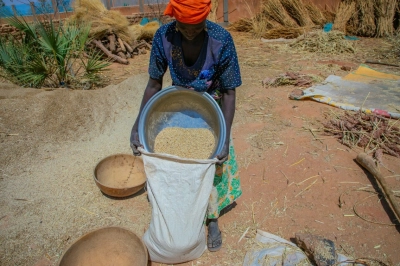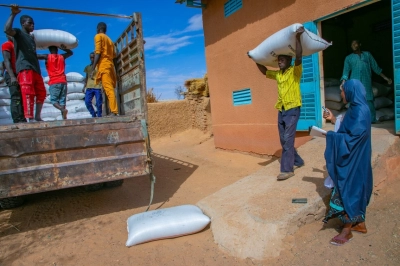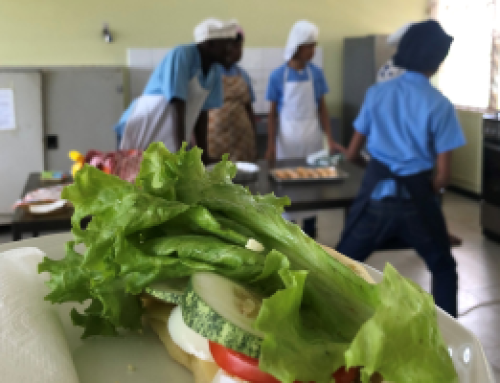By Jerry Lemogo in Niger

Zina Moussa a smallholder farmer and member of the Hadin kan Mata cooperative cleans her harvest of millet before delivering to a local warehouse. © Adamou Dan Salaou/WFP
It’s a warm busy morning in the village of Hakin Saatsi in the Maradi region in Niger. A group of men are seen loading bags of millet and cowpeas into a truck under the vigilant supervision of Haadji Sa’a Moussa, the President of the Hakan Maata Farmers’ Cooperative. This delivery is destined for nearby school canteens.
“It’s crucial to ensure everything goes as planned. Our children are the ones who are going to eat this food and we need to make sure that its quality and all transportation processes are monitored,” Sa’a Moussa said.
This cooperative led by Sa’a Moussa unites over 820 women farmers into a formidable force that drives local agriculture and rural development. “We are supporting the initiative to buy food locally, especially from women farmers’ to help them sell their produce to a stable market that pays better to generate income.” Before the initiative, she said, many women farmers were unable to raise enough money to pay school fees for their children.
“Many children, especially girls dropped out of school. Now that the women farmers are making better earnings selling to schools, the girls are returning to school and some have even enrolled into university,” Sa’s Moussa said.
However, the activities at Hakin Saatsi, where she was monitoring the loading of school food into trucks, are not isolated but part of a larger, transformative movement in the Maradi region. As a member of the School Meals Coalition, the Government of Niger is collaborating with various partners in supporting the cooperatives to improve quantity and quality of their agricultural produce to be able to supply schools.
Schools are realizing many benefits to buying local produce. It is enabling them to provide daily fresh hot meals to students while cutting down on transportation and handling costs.
On the other hand, when smallholders sell their produce in schools, they are economically empowered and economic growth is stimulated, pumping over USD 1.3 million back into Niger’s economy in 2023.
Over the past few years, Niger has made several steps to promote local purchasing for school meals. The government developed a National Strategy for Local Purchasing from Small Producers (SNALAPP), aimed at enhancing food security and nutrition, and stimulating rural economic growth.

At the WFP main warehouse, a group of men load bags of millet and cowpeas for delivery in schools. © Adamou Dan Salaou/WFP
The Regional Coordinator of school canteens in the Maradi region, Salou Abdou explains Niger’s commitment to boosting the local economy through better support to smallholder farmers.
“Our efforts are strengthening the links between our partners in school meals and the smallholders, enabling farmers to sustain a supply of quality produce in schools while they also earn a decent income,” says Abdou.
The initiative is trying to address a situation that has disadvantaged smallholder farmers in Niger for many years. Farmers do not always have the means to produce sufficient quantities of food that meets the quality and safety requirements required in markets such as school meal programmes. This often then forces them to sell their produce in low-paying markets.
To strengthen farmers’ capacities to improve quality produce and reduce production losses, Niger is implementing the Smallholder Agricultural Market Support (SAMS) Initiative.
Abdou said they are encouraging schools to purchase directly from local farmers’ cooperatives and organizations supported by the SAMS Initiative to have supplies on time, among other benefits.
The Ministry of Education, he says, is keen on expanding the initiative as they have seen its benefits on the quality and diversity of meals children can receive when schools buy from farmers in close proximity.
“Children can eat fresh meals they are familiar with. We would like to continue expanding a community of actors supporting efforts to promote local diets in schools and nurture a healthier and more productive next generation of adults.”




